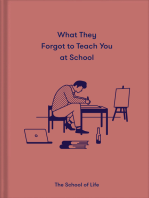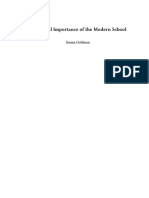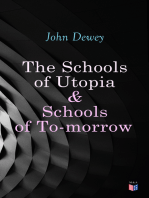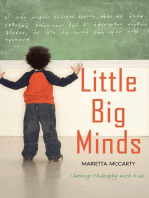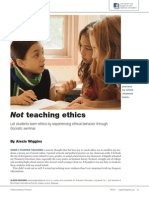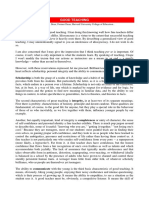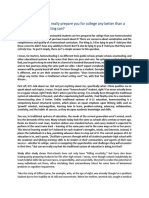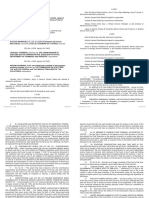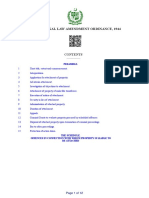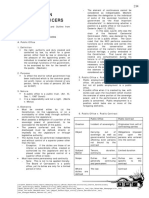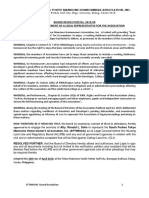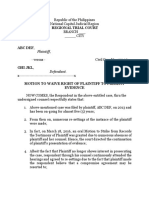0 ratings0% found this document useful (0 votes)
54 viewsEarly Journal Content On JSTOR, Free To Anyone in The World
Early Journal Content On JSTOR, Free To Anyone in The World
Uploaded by
lazybird899This document discusses children's ethical classes, where groups of 30 or fewer children are taught morality and ethics. It argues that such classes are valuable as they allow teachers to have close personal relationships with students and discuss ethics in an organized, connected way. General debates on moral instruction are less useful than focusing on this specific approach. Morality can be taught through such classes by drawing on students' everyday experiences and engaging them in thoughtful discussion of ethical issues and norms.
Copyright:
© All Rights Reserved
Available Formats
Download as PDF, TXT or read online from Scribd
Early Journal Content On JSTOR, Free To Anyone in The World
Early Journal Content On JSTOR, Free To Anyone in The World
Uploaded by
lazybird8990 ratings0% found this document useful (0 votes)
54 views14 pagesThis document discusses children's ethical classes, where groups of 30 or fewer children are taught morality and ethics. It argues that such classes are valuable as they allow teachers to have close personal relationships with students and discuss ethics in an organized, connected way. General debates on moral instruction are less useful than focusing on this specific approach. Morality can be taught through such classes by drawing on students' everyday experiences and engaging them in thoughtful discussion of ethical issues and norms.
Original Title
01536482942375977
Copyright
© © All Rights Reserved
Available Formats
PDF, TXT or read online from Scribd
Share this document
Did you find this document useful?
Is this content inappropriate?
This document discusses children's ethical classes, where groups of 30 or fewer children are taught morality and ethics. It argues that such classes are valuable as they allow teachers to have close personal relationships with students and discuss ethics in an organized, connected way. General debates on moral instruction are less useful than focusing on this specific approach. Morality can be taught through such classes by drawing on students' everyday experiences and engaging them in thoughtful discussion of ethical issues and norms.
Copyright:
© All Rights Reserved
Available Formats
Download as PDF, TXT or read online from Scribd
Download as pdf or txt
0 ratings0% found this document useful (0 votes)
54 views14 pagesEarly Journal Content On JSTOR, Free To Anyone in The World
Early Journal Content On JSTOR, Free To Anyone in The World
Uploaded by
lazybird899This document discusses children's ethical classes, where groups of 30 or fewer children are taught morality and ethics. It argues that such classes are valuable as they allow teachers to have close personal relationships with students and discuss ethics in an organized, connected way. General debates on moral instruction are less useful than focusing on this specific approach. Morality can be taught through such classes by drawing on students' everyday experiences and engaging them in thoughtful discussion of ethical issues and norms.
Copyright:
© All Rights Reserved
Available Formats
Download as PDF, TXT or read online from Scribd
Download as pdf or txt
You are on page 1of 14
Larly !ournal ConLenL on !
S1C8, lree Lo Anyone ln Lhe World
1hls arLlcle ls one of nearly 300,000 scholarly works dlglLlzed and made freely avallable Lo everyone ln
Lhe world by !S1C8.
known as Lhe Larly !ournal ConLenL, Lhls seL of works lnclude research arLlcles, news, leLLers, and oLher
wrlLlngs publlshed ln more Lhan 200 of Lhe oldesL leadlng academlc [ournals. 1he works daLe from Lhe
mld-sevenLeenLh Lo Lhe early LwenLleLh cenLurles.
We encourage people Lo read and share Lhe Larly !ournal ConLenL openly and Lo Lell oLhers LhaL Lhls
resource exlsLs. eople may posL Lhls conLenL onllne or redlsLrlbuLe ln any way for non-commerclal
purposes.
8ead more abouL Larly !ournal ConLenL aL hLLp://abouL.[sLor.org/parLlclpaLe-[sLor/lndlvlduals/early-
[ournal-conLenL.
!S1C8 ls a dlglLal llbrary of academlc [ournals, books, and prlmary source ob[ecLs. !S1C8 helps people
dlscover, use, and bulld upon a wlde range of conLenL Lhrough a powerful research and Leachlng
plaLform, and preserves Lhls conLenL for fuLure generaLlons. !S1C8 ls parL of l1PAkA, a noL-for-proflL
organlzaLlon LhaL also lncludes lLhaka S+8 and orLlco. lor more lnformaLlon abouL !S1C8, please
conLacL supporL[[sLor.org.
214 International Journal of Ethics.
CHILDREN'S ETHICAL CLASSES.
IN arguing for or against the definite moral instruction
of
children, we should always do well to differentiate between
class-teaching and private admonition. Everyone will admit
the value of the quiet talk by means of which a parent or friend
encourages a girl or lad in an honorable pursuit, warns against
mistakes and dangers, or reproves wrong-doing.
There is an
acknowledged value, also, in the semi-private praise
or blame
which the parent pronounces in the
presence of
sisters, brothers
and other members of a domestic circle. Of these forms of
home education I do not propose to speak. I shall not consider
methods by which children in public schools may be
practically
trained in manners and useful habits. Nor shall I discuss the
times and occasions when a teacher may legitimately seize
upon the virtues or follies of an individual scholar, and em-
ploy them as a test of ethical instruction. All these educa-
tional processes have their worth, and a complete scheme of
moral discipline must take due account of each. But I have
found from experience that a general debate rolling over many
points of this large subject is extremely unprofitable. I prefer
to deal with one department to which I have for a considerable
number of years given close attention, viz., the moral instruc-
tion of children in classes. I regard this department as the
culmination of the rest. It is in the class that all the ethical
threads should be connected and woven into a pattern of
thought, revealing to the child the meaning of the emotions
and experiences which have hitherto been scattered over his
family and social life.
By a class I understand a group of not more than thirty
children, regularly attached to a Sunday or day-school. It is
a very common thing in England to see teachers placed in
charge of classes of sixty or seventy scholars. Even this bad
practice is an improvement on the past. I shall never forget
the agonies I suffered in the hopeless attempt to teach a hun-
dred and twenty lads in a London hoard-school; and
stuch
Children's Ethical Classes.
215
cases were not infrequent. For the purposes of general educa-
tion, and above all, for the purpose of moral education, it is
indispensable that the teacher should be entrusted with only
so many children as he or she can deal with on a basis of close
personal knowledge and sympathy. It is also desirable
(and
ultimately it will be looked upon as a profound necessity), that
girls and boys should be taught in the same class. In
effect,
the class should be a symbol of the society which creates moral-
ity. The sexes are equally concerned in the study of ethical
practice; and no more powerful blow could be delivered at the
superstition which makes sex a social disability than ethical
co-education. I have taught boys and girls together hundreds
of times, and I consider that the objections to this method are
not worth discussing. Then, again, the class will contain a
variety of types of character and social position. To each and
all the moral law appeals; upon each and all the same duties
are laid; and the class becomes an admirable aid towards estab-
lishing the consciousness of a Norm with which all must com-
ply. This mention of the Norm prompts me to remark that,
in a well-conducted class, moral eccentricity receives a silent
check. Everyone familiar with children knows how private
conversation with an offender often provokes him into pert
excuses and pleas for personal exemption from an inconvenient
discipline. Such incidents rarely occur in a class. Children
respect one another's opinions. Leaving out absurd answers
due to misconception of the teacher's meaning, and the like,
I can recall no case of an abnormal reply given me by any of
my scholars. Nor can I remember many smart or witty an-
swers such as one finds retailed in the apocryphal department
of the public journals. Whenever I hear of a ridiculous or
extraordinary answer made by a scholar, I at once suspect the
teacher of maladroitness or lapse of dignity. The emotions,
also, should only be moderately
played upon. It is right that
a well-told story should stir the imagination and touch the
heart, and it is delightful to hear the occasional laughter of
the young listeners, at a stroke of timely humor. But the
deeper springs should very seldom be meddled with. The
scholars themselves mistrust this kind of excess. How it may
2i6 International Journal of Ethics.
be with Continental children I do not know, but I believe
British children regard a tendency to tears with a sort of dis-
dain. It is also a great advantage in class-teaching that the
introspective habit is avoided. The children do not (or should
not) hear their personal faults reproved by way of illustra-
tion. The cases adduced will be general, and held up, as it
were, to the social light for social discussion. The minds of
the scholars are drawn outwards to their moral environment,
and there is no encouragement to brood over interior problems.
"Can morality be taught ?" is a very trite question. A denial
of the possibility of such teaching appears to some people a
mode of philosophic recreation. Nevertheless, the world at
large takes the subject quite seriously, and, by innumerable
pulpits, instruction-books and daily conversations, proves its
conviction that the moral nature can be moved to good action
by
the power of good words. It is almost amusing to note how
persons who object to direct moral instruction themselves en-
gage in the practice when they tell a child of its faults or
praise it for its well-doing. As a matter of fact, ethical in-
struction is the commonest form of education, and the house-
holds of the world ring with precept and admonition all day
long. The class-teacher simply changes the fragmentary into
the connected, and the scattered into the organized. It is, of
course, open to anybody to dispute the utility of the pulpit and
platform, but if the utility of the pulpit (in the most rational
acceptation) be admitted, then the benefit of ethical class-
teaching must also be admitted. Child-psychology exhibits no
essential difference from the psychology of adults. Naturally,
the child-universe, the child-language and the child-experience
are more limited than at the later stages of life. That is all.
In the fundamentals of motive, intellectual method and moral
re-action, children precisely resemble men and women. The
popular pursuit of "child-study" is a mere imbecile amusement
if it is based on the supposition that the young mind
belongs to a separate species. It is a safe rule for the
teacher to treat childhood as manhood on a reduced scale. But
in appreciation of the phrase "on a reduced scale" lies the
whole of the vast art of pedagogy. And if I have reasoned
Children's Ethical Classes.
217
ccrrectly, it will follow that the
pulpit must find its
natural
analogue in the ethical class.
Having granted that the man
or
w-oman may be influenced by the
preacher, we must allow
that
the boy or girl can be reached by the ethical instructor.
To
this general argument may be added the
following detailed
c -1nsiderations:
(i) The theme of moral conduct possesses a natural and
perennial
interest. Even if philosophers and parents abolished
ethical teaching, it would be more or less crudely maintained
by the children
themselves, for they will
perpetually tell each
other what is fair and unfair, seermly or unseemly. And
what
deeply interests the human mind should never be excluded
fromr education. (2) It .is understood that this department of
instruction calls for the special training of teachers. Not to
the amateur should be entrusted the task of sculpturing the
fine marble of the child-soul. I do not suggest the creation of
an ethical clergy destined for the work of teaching the young.
The ordinary elementary or secondary school teacher is a sutffi-
ciently loyal and capable workman; only he needs preparation
and the guidance of authority. By "authority" I simply mean
that the best books, apparatus and professional experience shall
be placed at the service of the young student, and that he shall
have the benefit of judicious criticism and theoretical lectures.
(3)
The cooperation of the parent should be ensured. In the
present unorganized condition of moral education, it is not easy
to define the extent and value of such cooperation. But every
effort should be made to impress upon parents the fact that
ethical training is not a subject to be dealt with only inside the
school-walls; the teacher nmst be warned against the supersti-
tion that his professional lessons can displace the need for home
influence; and teacher and parent should maintain such per-
sonal communication as will enable each to appreciate the dif-
ficulties and opportunities of the other.
(4)
The imagination
is a powerful engine in ethical discipline. It is not in itself a
moral element, but it gives right feeling a larger scope of
exercise, and brings wider areas of sympathy under cultivation.
A narrow intellect cannot possibly have catholic charity. The
commandment, "Love one another" must follow upon the com-
Vol. XI.-No. 2
15
2I8 International Journal of Ethics.
illandment, "Understand one another." This understanding
can only be effected by an orderly use of the imagination; and
everyone will concede that the imagination can be strengthened
by pictures, stories, poetry and dramatic compositions. (5)
With as great readiness it will be admitted that the child's
judgment can be expanded and regulated under the guidance of
a skilled teacher. Plato's dialogues (which may be taken as
a noble example of ethical instruction applicable to adults) are
intended to educate the reader's moral judgment, and
they
undoubtedly succeed in doing so. They may not make the
reader more virtuous in deed, but they give a new keenness to
the consciousness of his sin or merit. This keen consciousness
miay arrive too late to control the force of old habit in the adult,
but. in the case of the child, its formation is timely, and vital.
Moral instruction must have an inspiration and a method.
The inspiration can, in my opinion, only be supplied with
fullness and enduring power by the idealization of humanity.
By that I mean such a presentation of human relations, activi-
ties and character as will arouse the child's admiration for
moral purpose and moral conduct. Through carefully chosen
illustrations, the mother will be displayed as the central em-
bodiment of love, patience and sincerity. The father will fur-
nish the type of labor and providential care. Incidents of daily
occupation and of right aims rightly achieved will show the
moral dynamic, and create an interest which should surpass,
in depth and purity, the excitement called up by mere exploit
and adventure. All these materials will be crystalized round
certain ideal axes,-certain leading conceptions, of which it
may be sufficient to name Self-control, Veracity, Kindness and
Justice. The teacher will never dwell on the abstractions; but,
just as the dramatist recommends justice by means of the just
man placed in a picturesque environment and clothed with suit-
able costume, so the ethical teacher will seek to portray the
virtues by means of virtuous men and women, or, to speak more
accurately, by means of men and women in their virtuous as-
pects. And here I may advert to a subject which, though
apparently a detail, is truly of primary interest, and that is the
question whether lessons should ever deal with faults and vices
Children's Ethical Classes.
2I9
as the main themes. I should emphatically say, No. Our first
aim is to make right conduct appear beautiful, and not to
make
wrong-doing appear ugly. It is
perfectly true that he
who
loves the pure will eschew the base; but the repulsion against
evil is never really wholesome unless it follows as a sequel to
an attraction towards the good. Nothing is easier, even to a
third-rate teacher, than to make badness
interesting; and
inter-
est is the very key to the human will; and he who depicts bad-
ness as interesting (and fervent condemnation is often enough
to produce this result) may unwittingly smooth the
psychologi-
cal path towards its acceptance by the will. I feel
bound,
therefore, to disagree with the method pursued by Miss Ger-
trude Martineau in her "Outline Lessons on Morals" (the list
of lessons containing the topics of .Anger, Conceit, Covetous-
ness, Cowardice, Envy, Hatred, Hypocrisy, Jealousy, Laziness,
Malice, Pretentiousness, Procrastination, Revenge, Self-indul-
gence, and Vanity), and by Mr. WV. L. Sheldon, in his work
on "An Ethical Sunday-School" (his syllabus including lessons
on Conceit, Laziness, Swearing, Procrastination, Cheating,
and Jealousy). I hasten to add that neither Miss Martineau
nor Mr. Sheldon would be likely to do any practical harm by
their mode of treatment, because they are both too much
impressed with the
dignity of the positive ethics. But the habit
of dealing with negative aspects is educationally weak, and may
lead to undesirable consequences in the case of less skilled
teaching. And yet another saving clause should be noted. I
by no means wish to imply that faults and evils ought never to
be touched upon; but the supreme stress should always be laid
upon the good qualities, leaving the bad to be treated as subsid-
iary in importance and interest.
The method will involve certain principles of selection in the
gathering of materials, and certain principles of action in the
conduct of the lessons.
First, as to the gathering of materials.
I
put this point first
because it has not yet received adequate attention by the general
public, and progress cannot be made until it is accepted as a
fundamental element. Broadly speaking, the illustrations must
be taken from the whole field of sociology, including history
220 International Journal of Ethics.
and biography. One need not stay to complain that the area
hitherto drawn upon in popular education has been limited
mainly to a few epochs of Jewish and early Christian
history.
We must now make the area conterminous with the human
race. Every nation, every tribe, every family, is capable of
yielding examples of the universal morality which is sufficiently
represented by Self-control, Veracity, Kindness and Justice.
Not only can we find examples universally, but we ought
to do
so. How else are we to form the vivid conviction in the minds
of children that the laws of right conduct are applicable to per-
sons in all varieties of language, color, class and condition?
How else can we prepare the way for the politician of the
future, who will proclaim an international ethics and refuse to
recognize distinctions of race? I confess I am somewhat stag-
gered at the magnitude of the task I am suggesting. Having
searched among the available sources of illustration (stories,
fables, etc.), for several years, I am astonished at the poverty
of materials. The stories are often hackneyed; they are often
obsolete for purposes of the modern ethical taste; and they are
very restricted in range. A Swiss lady some time ago kindly
offered to supply me with anecdotes culled from French and
German juvenile literature, and I confidently expected an acces-
sion of new treasures. She sent ime an ample batch of prose
and poetry. A considerable nunmber were familiar to me from
a perusal of British reading books for the young; and a large
proportion of the remainder were marked by the same lack of
freshness and appropriateness as one observes in so many of
our native samples. The story of the wives of Weinsberg may
be cited as a typical instance. At the surrender of Weinsberg,
the Emperor Conrad, who had conducted the siege, declared
that, as a punishment for their contumacy, all the garrison
should be put to the sword; the women, however, might carry
out any valuables they pleased and retain life and liberty. On
the appointed day the gates of the city opened, and, according
to one authority, "the throng poured forth, heavily laden
indeed, but bearing neither gold nor household goods. Each
true wife bore on her shoulders her doomed husband, and car-
ried him out of the city, the safety of her burden being guaran-
Children's Ethical Classes. 22I
teed to her by the word of an emperor," etc. This story, to say
the least, has a semi-mythical air, and I regard the half-myth
as a very dubious aid to moral instruction. The whole myths
(i sop's fables, poetical allegories
such as
Longfellow's
"Ex-
celsior," etc., and the classical legends) are free from danger;
the children frankly take them as fiction, and easily perceive the
ethical lesson. But the half-myth is perilous; it confuses the
child's wit, and it suggests that the most important moral situ-
ations are to be found in abnormal circumstances. WMhat we
should teach is precisely the opposite. We should seek to con-
vey the fact that the moral life is a daily Norm, fashioning all
petty occupations and incidents into lines of consistent purpose
and character; and that the will which is built up by exercise
in normal conditions can successfully grapple with the unusual
demands of a crisis. A specific and organized quest for ethical
material is greatly needed. Educationists should everywhere
examine poetry, history, legend, folk-lore, and biography, in
order to unearth fresh stores of illustration; and, in addition to
this literary exploitation, we ought to institute collections of
anecdotes of passing events in public life 'and home circles.
These collections would be published in educational papers
after due assortment and the removal of irrelevant details. I
specially prefer the anecdote because it can be handled with
facility and readily fitted into the central theme, whereas a long
story is apt to master one, consume too much time, and obscure
the moral issue by the fascination of its plot. It is right to
remember, also, that the illustrations may be concrete as well as
literary. Pictures may be frequently introduced. A picture of
the Forth railway bridge may evoke admiration for well-
proportioned and patient construction, a copy of Turner's
Temeraire may poetically stand for the reverence due to old age
and long public service, and a reproduction of a figure of the
ugly Hephaestus may pathetically hint at the association
between the physical deformity of the Worker and the beauty
and usefulness of his XWork.
Second, as to the conduct of the lesson. I suppose it is ortho-
dox to require that the teaching should be catechetical, and, for
fear of being suspected of heresy, I recommend the discreet use
222 International Journal of Ethics.
of the question-and-answer method. But the teacher need not
be disappointed if he seldom receives ingenious and penetrating
replies. There is a prevalent but very absurd opinion that the
instructor's office is to educe or "draw out" knowledge. It is
his office to draw out the child's capacities, but no amount of
catechism will educe knowledge which the child does not pos-
sess. The advantages of questioning are chiefly indirect. Ques-
tioning gives a fillip to the attention; it
may
neatly demonstrate
the scholar's ignorance, and so prepare the ground for explana-
tions; it affords a most useful means of recapitulation; and it
provides a running test of the children's acquaintance with inci-
dental but not unimportant facts. Thus, if the teacher should
chance to mention Athens, and pause to ask: "Do you know
where Athens is?" he is at once able to gauge the children's
knowledge of the environment of the story he is relating. And
though geographical and historical details must never be
allowed to overlay the moral purpose of the lesson, yet precision
in minor points will always assist towards a stronger appre-
hension of the central idea. A blackboard should be the ethical
teacher's constant companion. The moralist will not despise
accuracy. When he has made clear to the children, by means of
appropriate examples, the truth that industry is not spasmodic
labor, but a continuous method, he will wisely strengthen the
conception by writing up the brief definition, "Industry is the
habit of working." If he should mention Socrates or Savon-
arola, he will assist the memory by placing the name on the
board. When he censures or ridicules the fault of exaggera-
tion, he will perhaps, with a few strokes of the chalk, trace how
the little "agger" of original fact has grown into a monstrous
heap of make-believe. Another factor which calls for the
greatest possible care and study is the language in which the
lessons are conveyed. A teacher is literally justified or con-
demned by his words. A strong simplicity is the ideal.
Neither words nor sentences should be complex. But simplic-
ity must be allied with strength. Allowing for the difference
in range of ideas and knowledge, the language addressed to the
young
should be as
emphatic,
direct and
logical
as that
addressed to adults. The same rule (if I may make a very
Children's Ethical Classes. 223
slight digression) applies to juvenile literature. Three-fourths
of the books ostensibly prepared for children are badly written.
Their diction is cumbrous and precocious, and the average
child (and one has always to study the average) is led into the
fatal habit of taking in words without the corresponding sense.
Lucidity is necessary in any subject, and in moral instruction
above all. But the most essential quality in the ethical teaching
is the dramatic. The drama derives its interest from its moral
movements, and morality deserves the finest dramatic presenta-
tion which the conditions of class teaching will allow. By
"dramatic presentation" is simply intended a lively and spirited
manner of telling the illustrative stories-just the manner, in
fact, which most of us adopt when we relate to a friend an inci-
dent that has affected us with any species of emotion. I select
from a children's reading-book the following story which, for
neatness and point, may be taken as a model illustration for an
ethical lesson:
"Pliny, the ancient naturalist, relates that the people of a certain district
in Italy were much surprised at the fine appearance and great fertility of
a farm belonging to one amongst them named Cresin. As their own lands
were poor and barren, they conceived that Cresin must employ some mag-
ical arts in order to make his ground vield such abundance. Accordingly,
they brought him before a judge, and accused him of being an enchanter.
Cresin, being called upon for his defence, brought forward a stout girl, his
daughter, and also his implements of husbandry and the cattle which drew
his plough. 'This girl,' said he, 'pulls all the weeds which grow on my
farm. I manure it carefully, to enable the ground to bear good crops. You
see that all my implements are in the best order, and that my cattle, which
I take pains to feed well, are the strongest in the country. Behold all the
magic I use in the management of my farm! Any one of my neighbors
may have as good crops as I, if he will use the same means.' The judges
said they never had heard a better pleading, and dismissed Cresin with
many commendations of his industry."
No capable teacher would begin by saying, "Pliny, the
ancient naturalist," etc. Pliny would disappear, or receive
only casual allusion. The opening would rather be effected in
this way: "Some people stood looking at a fine field of corn.
They nodded, they frowned, they pointed, they whispered.
'There is something wrong about this corn of Cresin's,' they
said," and so on, the teacher suiting the action to the word, but
not demonstratively or excessively. Other scenes in the small
224 International Journal of Ethics.
drama will be furnished
by
the arrest, the accusation, the call-
ing of witnesses, the quiet sentence of the judges, and the dis-
comfiture of the suspicious neighbors. It might happen that
this very story formed the commencement of a lesson on the
wonders and benefits of human industry. And just as the
teacher would not dream of first saying "Pliny, the ancient
naturalist," etc., so neither would he dream of announcing,
"Children, I am going to talk about the wonders and benefits
of human industry." He would plunge into his narrative in the
manner described. The attention of the class is immediately
enchained, and, before they are conscious of the process, their
sympathy is enlisted on the side of Cresin's diligence, persever-
ance, common-sense and frank explanation. The instructor
will have prepared a clear plan and analysis of his theme, but it
will be hidden from the children until he chooses to reveal it
step by step.
The instruction should be systematic and graded. Whether
the lessons are given weekly or daily, they should form a com-
plete catena. The first necessity is that the ethics be enforced
as a practical and living subject, and the second is that it be con-
structed logically and with regard to proportion. Thus, in ex-
pounding the nature of Justice, we shall proceed from the sim-
ple cases of the home and playground to the more complex cases
of the political, social and religious worlds; from the problems
of daily manners to the difficult
questions
of the industrial life
and international relations; from the rights and wrongs con-
nected with property to the subtler claims arising from intellec-
tual and religious conditions. And the regard to proportion
will ensure that the interaction of the virtues be kept in contin-
ual view. If, for example, we fix our attention on the topic of
Kindness, we shall avoid identifying this quality with the
whole moral life. The kind man must maintain Self-control,
else he may fall into lavishness of gifts, and injudicious servil-
ity to another's whim and selfishness. He will respect the
Truth, and not hesitate, out of benevolence, to tell his honest
opinion. He will adhere to Justice, and refrain from giving
praise or material rewards when they are unmerited. This
mutual check of the ethical faculties (if I may use a term which
Children's Ethical Classes.
225
psychologists now affect to disdain) is of profound importance;
it calls out the forces of wholesome criticism; it is perfectly
within the compass of the average child's intelligence; and it
leads to the conception of the oneness of the moral nature,
summing up all good thoughts and deeds into the organic whole
which the Greeks knew as Wisdom.
Broadly speaking, the grades of instruction will be three;
but I mention the following stages quite tentatively, feeling
that we need more experience before we formulate our doc-
trine: (i) The Rudimentary, for scholars aged from six or
seven years to nine or ten. Here I should suppress definitions
and formal discussion. The staple of instruction would con-
sist of tales of animal life, talks about pictures, selected fairy-
tales (nearly the entire range of fairy-tale literature needs re-
writing for ethical purposes), intelligent recitation of narrative
poems, and action-songs. These items should not jostle miscel-
laneously, but follow some exact arrangement by way of prepa-
ration for the second stage. Certain tales, songs and pictures
would fall under the chapter of Self-control, others under
Veracity, and so on. But, except in a quite casual manner,
these ethical terms need not come to the surface, and no lesson
should wind up with the venerable "Hence we may learn." To
put the idea in a short figure-of-speech, I should describe the
primary stage by the phrase, the Uninterpreted Parable. (2)
The Analytic, appropriate to ages from ten to fourteen or
thereabouts. To this stage I have personally devoted most
attention. It should pursue the course of moral conduct
through the definite divisions of Self-mastery, Truthfulness,
Kindness, Duty, Justice, etc., and their many sub-sections cov-
ering the facts of life in the household, city and state. The
whole of the leading ethical terms should now emerge into
discussion, and appear and re-appear in all kinds of examples
and synonyms. Definitions should often be cited, not for rigid
committal to memory, but in order to impress the necessity for
accuracy of thought as an aid to consistency of action. Here
we shall require the unlimited drafts upon the world's records
of good deeds which I have already pleaded for. The child's
knowledge will not yet be deep, but it ought to be co-extensive
226 International Journal of Ethics.
with the great human fraternity. In all the social movement
will be seen the gradual assertion and advance of the ideas of
Self-control, Veracity, Charity, Honor, Justice, and the like.
This stage may be called the Parable Interpreted. (3) The
Synthetic, or Historical and Civic. The discrete ideas may
now be combined in regular studies of social progress along
various lines, as, for instance, the histories of dwellings and
cities, of the various arts and industries, of means of communi-
cation, of manners and customs, of forms of government, of
the fine arts and literature, of the typical religions. These
courses would be closed by lessons on the work and problems
of the modern state, in all its
many
aspects of the franchise,
police, penal systems, education, cooperation, etc. From a care-
ful presentation of all these details would arise the ideal of the
civic life and duty,-of the universal Humanity which we
spring from, and which we serve whenever we tread the ethical
way. I should name this third grade the Idealization of Man-
hood.
On all sides one hears the complaint that, amid the complex-
ity of knowledge and of interests, we are failing to grasp the
essential moral principles that underlie and unify our manifold
experiences. In the individual life this failure causes doubt,
laxity of purpose, poverty of moral imagination, and lowness
of aim. In the social life, it causes a perpetual conflict of ethical
opinions and ideals, and constant difficulty in organizing the
moral units and forces of the commonwealth. It is a tradition-
al fallacy of the schoolmaster to suppose that a methodical
school-discipline will obviate all the evils of human life.
School-discipline makes only one factor among many import-
ant means towards the education of the human race. But after
we have succeeded in allotting proportionate values to physical
training, intellectual exercises, and the regulation of economic
conditions, we shall perhaps conclude that the place of honor
must be given to the systematic moral instruction of young
citizens. Only by this instrument can we fully methodize
domestic and public morality, and construct the Ethical
Religion.
F. J. GOULD.
LEICESTER, ENGLAND.
You might also like
- What They Forgot To Teach You At School: Essential emotional lessons needed to thriveFrom EverandWhat They Forgot To Teach You At School: Essential emotional lessons needed to thriveRating: 4.5 out of 5 stars4.5/5 (17)
- Afp Manual For Courts MartialDocument146 pagesAfp Manual For Courts MartialJet Malabanan100% (6)
- Towards A Philosophy Of Education: With linked Table of ContentsFrom EverandTowards A Philosophy Of Education: With linked Table of ContentsRating: 4 out of 5 stars4/5 (15)
- Contemporary Educational TheoriesDocument17 pagesContemporary Educational Theoriespixievargas100% (2)
- Contemporary Educational TheoriesDocument19 pagesContemporary Educational TheoriesYasmeen Jaffer100% (3)
- Unschooled: Raising Curious, Well-Educated Children Outside the Conventional ClassroomFrom EverandUnschooled: Raising Curious, Well-Educated Children Outside the Conventional ClassroomRating: 4 out of 5 stars4/5 (7)
- Matrix of Amendments To The Rules On EvidenceDocument341 pagesMatrix of Amendments To The Rules On EvidenceJay Ar75% (4)
- Palestine Community Network Letter To UNDocument20 pagesPalestine Community Network Letter To UNRebelPunditNo ratings yet
- Emma Goldman The Social Importance of The Modern SchoolDocument8 pagesEmma Goldman The Social Importance of The Modern SchoolDani SilvaNo ratings yet
- Educational PhilosophersDocument9 pagesEducational Philosophersapi-418534829No ratings yet
- The Schools of Utopia & Schools of To-morrow: Illustrated EditionFrom EverandThe Schools of Utopia & Schools of To-morrow: Illustrated EditionNo ratings yet
- Winch - 1927 - The Necessity of Experimental PedagogyDocument7 pagesWinch - 1927 - The Necessity of Experimental PedagogyA HollisNo ratings yet
- Adult Education H. Spencer LewisDocument4 pagesAdult Education H. Spencer LewisJungOccultNo ratings yet
- Seminario de Didactica - Eliana Nuñez Da Silva - Task 1 (1)Document12 pagesSeminario de Didactica - Eliana Nuñez Da Silva - Task 1 (1)Eliana Nuñez Da SilvaNo ratings yet
- What Is A True EducationDocument6 pagesWhat Is A True Educationbrennenjack100% (1)
- The Schools of Utopia & Schools of To-morrow (Illustrated): A Case for Inclusive EducationFrom EverandThe Schools of Utopia & Schools of To-morrow (Illustrated): A Case for Inclusive EducationNo ratings yet
- Bruner Folk PedagogyDocument23 pagesBruner Folk PedagogySonia Janeth Hernandez CarrilloNo ratings yet
- Baxi, Teaching As ProvocationDocument9 pagesBaxi, Teaching As Provocationadityaatram58No ratings yet
- HSL Adult EducationDocument5 pagesHSL Adult EducationusrmosfetNo ratings yet
- Education and DisciplineDocument4 pagesEducation and DisciplineAhmad HachemNo ratings yet
- In Praise of Idleness Education and DisciplineDocument4 pagesIn Praise of Idleness Education and DisciplineMuhammad ZamanNo ratings yet
- The Schools Our Children Deserve: Moving Beyond Traditional Classrooms and "Tougher Standards"From EverandThe Schools Our Children Deserve: Moving Beyond Traditional Classrooms and "Tougher Standards"No ratings yet
- Schools of Tomorrow & The Schools of Utopia: Illustrated EditionFrom EverandSchools of Tomorrow & The Schools of Utopia: Illustrated EditionNo ratings yet
- School Education: With linked Table of ContentsFrom EverandSchool Education: With linked Table of ContentsRating: 5 out of 5 stars5/5 (8)
- Little Big Minds: Sharing Philosophy with KidsFrom EverandLittle Big Minds: Sharing Philosophy with KidsRating: 4.5 out of 5 stars4.5/5 (8)
- Schools Of To-morrow & The Schools of Utopia (Illustrated Edition): A Case for Inclusive Education from the Renowned Philosopher, Psychologist & Educational Reformer of 20th CenturyFrom EverandSchools Of To-morrow & The Schools of Utopia (Illustrated Edition): A Case for Inclusive Education from the Renowned Philosopher, Psychologist & Educational Reformer of 20th CenturyNo ratings yet
- Not Teaching Ethics ArticleDocument3 pagesNot Teaching Ethics ArticleYeni CodigoNo ratings yet
- Philosophy and Education (Mohr-Lone & Israeloff) Parts II Through VIDocument142 pagesPhilosophy and Education (Mohr-Lone & Israeloff) Parts II Through VIКалоян АрнаудовNo ratings yet
- Critical Ed 2Document7 pagesCritical Ed 2Don Domenico DNo ratings yet
- Socratic Seminar, KozinskiDocument56 pagesSocratic Seminar, KozinskiThaddeusKozinskiNo ratings yet
- The Great Conversation: at MontfortDocument58 pagesThe Great Conversation: at MontfortThaddeus KozinskiNo ratings yet
- The Philosophy Foundation Provocations: Philosophy for Secondary SchoolFrom EverandThe Philosophy Foundation Provocations: Philosophy for Secondary SchoolNo ratings yet
- LANCASTER, Joseph. Improvements in Education 1803Document22 pagesLANCASTER, Joseph. Improvements in Education 1803CarmenNo ratings yet
- Good Teaching PDFDocument3 pagesGood Teaching PDFMelisa Taguiam CalipjoNo ratings yet
- On Education - Albert EinsteinDocument4 pagesOn Education - Albert EinsteinUtsav Jain0% (1)
- What Is and What Might Be A Study of Education in General and Elementary Education in ParticularFrom EverandWhat Is and What Might Be A Study of Education in General and Elementary Education in ParticularNo ratings yet
- The Students are Watching: Schools and the Moral ContractFrom EverandThe Students are Watching: Schools and the Moral ContractTheodore SizerNo ratings yet
- Tibor R. Machan-A Primer On Ethics (1997)Document201 pagesTibor R. Machan-A Primer On Ethics (1997)morgan385100% (1)
- A Historic-Critical and Literary-Cultural Approach to the Parables of the Kingdom: A Language Arts Textbook on the New Testament ParablesFrom EverandA Historic-Critical and Literary-Cultural Approach to the Parables of the Kingdom: A Language Arts Textbook on the New Testament ParablesNo ratings yet
- Why Children Should Study PhilosophyDocument3 pagesWhy Children Should Study PhilosophyAnonymous ORqO5yNo ratings yet
- Dobrolyubov On EducationDocument19 pagesDobrolyubov On EducationVladi IlichNo ratings yet
- Sample SpeechDocument3 pagesSample SpeechEthan LopezNo ratings yet
- The Infant SystemDocument72 pagesThe Infant SystemthanhhuyennobingoNo ratings yet
- Jacob Klein On WonderDocument14 pagesJacob Klein On WonderMayra Cabrera0% (1)
- Writ Petition - Gauhati HC - Dulal UddinDocument15 pagesWrit Petition - Gauhati HC - Dulal UddinEleventh ColumnNo ratings yet
- 06 Diman v. Alumbres (Solis)Document2 pages06 Diman v. Alumbres (Solis)Rafael Alejandro Solis100% (1)
- Vilar vs. ParaisoDocument7 pagesVilar vs. ParaisoJessica BernardoNo ratings yet
- ICCPR and ICESERDocument2 pagesICCPR and ICESERjulio simanjuntakNo ratings yet
- Villanueva Vs NiteDocument4 pagesVillanueva Vs NiteEmelie Marie DiezNo ratings yet
- CPC - All Cases PDFDocument31 pagesCPC - All Cases PDFbbs_tarunNo ratings yet
- Sample Motion For Change of Venue Under Code of Civil Procedure Section 397 C For California PDFDocument3 pagesSample Motion For Change of Venue Under Code of Civil Procedure Section 397 C For California PDFsonia paulingNo ratings yet
- LTFRB Spa SamsonDocument2 pagesLTFRB Spa Samsoncris jaluageNo ratings yet
- Right To Speedy TrialDocument5 pagesRight To Speedy TrialFrancesco Celestial BritanicoNo ratings yet
- Motion For Rehearing On Probate JudgmentDocument25 pagesMotion For Rehearing On Probate JudgmentWeston Sechtem0% (1)
- People of The Philippines Vs Rafael Olivares, Jr. and Danilo ArellanoDocument1 pagePeople of The Philippines Vs Rafael Olivares, Jr. and Danilo ArellanoDylanNo ratings yet
- Henry E. Rao v. Hillman Barge & Construction Company, 467 F.2d 1276, 3rd Cir. (1972)Document3 pagesHenry E. Rao v. Hillman Barge & Construction Company, 467 F.2d 1276, 3rd Cir. (1972)Scribd Government DocsNo ratings yet
- Sawyer v. Town of Ashland, NH, 27 F.3d 554, 1st Cir. (1994)Document5 pagesSawyer v. Town of Ashland, NH, 27 F.3d 554, 1st Cir. (1994)Scribd Government DocsNo ratings yet
- Araneta v. DinglasanDocument2 pagesAraneta v. DinglasanayasueNo ratings yet
- How To Make A Public Interest DisclosureDocument2 pagesHow To Make A Public Interest DisclosureSBS_NewsNo ratings yet
- Alternative Sentencing WordDocument2 pagesAlternative Sentencing WordArun Vignesh MylvagananNo ratings yet
- United States v. Kenny Koonge, 4th Cir. (2000)Document6 pagesUnited States v. Kenny Koonge, 4th Cir. (2000)Scribd Government DocsNo ratings yet
- The Criminal Law Amendment Ordinance, 1944Document12 pagesThe Criminal Law Amendment Ordinance, 1944Shahid HussainNo ratings yet
- Project Employee Work ContractDocument1 pageProject Employee Work ContractCristineNo ratings yet
- Moncado v. People's CourtDocument1 pageMoncado v. People's CourtRon Jacob AlmaizNo ratings yet
- Hiyas Savings Vs AcunaDocument1 pageHiyas Savings Vs AcunaJohn Fredrick BucuNo ratings yet
- Law On Public OfficersDocument27 pagesLaw On Public OfficersMarvin CabantacNo ratings yet
- Spouses Jimenez v. Patricia IncDocument2 pagesSpouses Jimenez v. Patricia IncMaya Julieta Catacutan-EstabilloNo ratings yet
- 3.D.4 NPC vs. CADocument1 page3.D.4 NPC vs. CAJohannes Jude Alaba100% (1)
- 2019-08 BR To Hire A LawyerDocument2 pages2019-08 BR To Hire A LawyerN-jay ErnietaNo ratings yet
- Case Digest Iron Steel Vs CADocument2 pagesCase Digest Iron Steel Vs CAEbbe Dy100% (1)
- Sample Motion To Waive Presentation of Plaintiff's EvidenceDocument3 pagesSample Motion To Waive Presentation of Plaintiff's EvidenceLeyah JosefNo ratings yet
